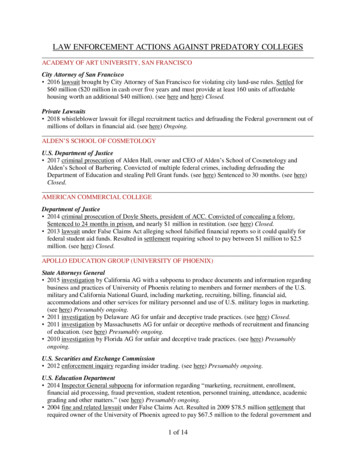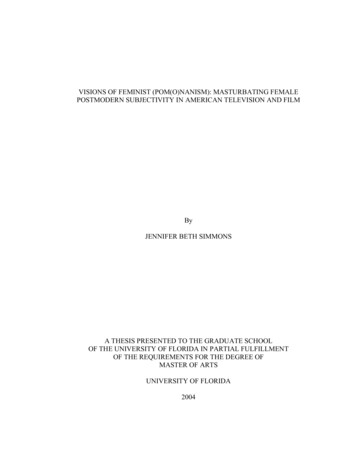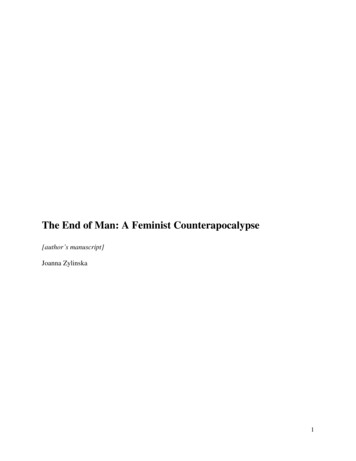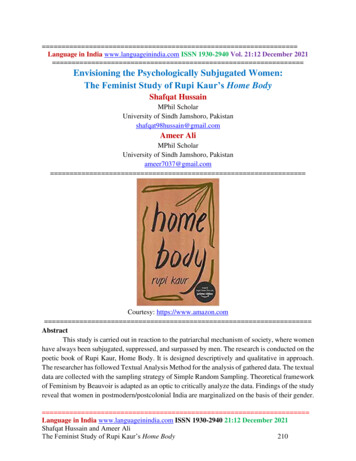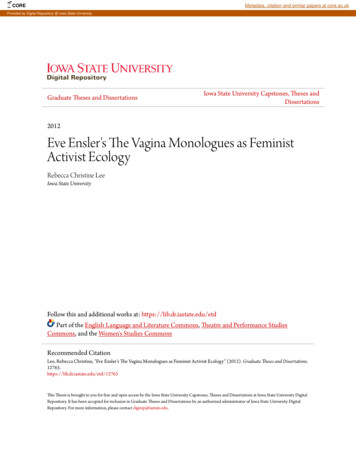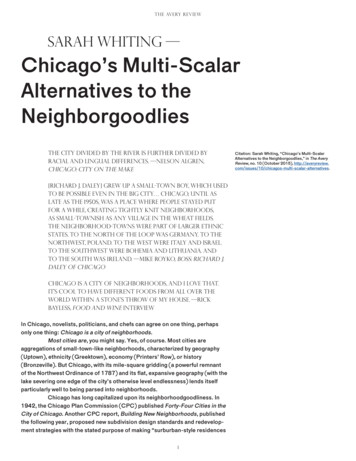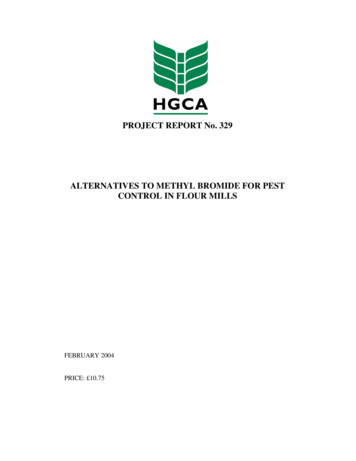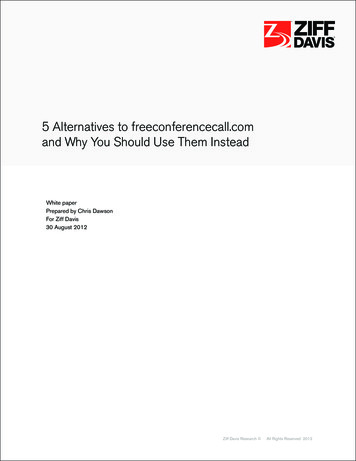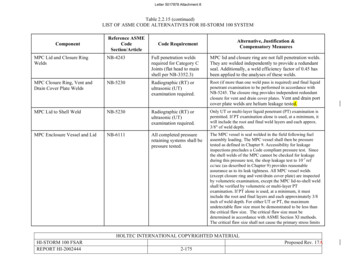
Transcription
#7DECEMBER 2018Feminist alternatives to predatory extractivism:Contributions and experiences from Latin AmericaMarianna FernandesFeminist alternatives to current development models dependent on the predatory relationshipbetween societies and the environment are already in the making. They assume that it isimportant to build another economy and another way of doing politics in order to subvertthe system in which we currently live. Change the world and change women’s lives in thesame movement: the struggle for women’s autonomy and emancipation is attached to thestruggle against patriarchal capitalism and racism, as well as against old and new formsof colonization, all of which organize predatory extractivism1.Capitalism depends on the control over women’s bodies,sexualities and territories to establish and perpetuateitself. There is a deep connection between the variousoppressive forces that affect women’s lives: patriarchy,(neo) colonialism and racism work together withcapitalism to guarantee the accumulation of capital.In this process, the exploitation and commodificationof women’s paid and unpaid work,women’s bodies and women’s territoriesare necessary conditions. Since the goalof capitalist economy is to accumulatecapital and to concentrate it in thehands of a few privileged subjects, thewhole socio-economic structure will be organized toguarantee that process. This happens at the expenseof nature and of most people’s lives.In the context of capital accumulation, the work of socialreproduction, of sustaining life and of care are delegatedto the invisible economic spheres. These spheres are, intheir turn, feminized and placed in the private, in thedomestic. Capitalism depends on maintaining women’sIn this work, the term predatory extractivism refers to the largescale processes of appropriation of nature, mainly by transnationalcompanies, through the extraction of raw materials - such as oil,minerals, water, fish, industrial agriculture, amongst others – as wellas the infra-structure mobilized to make this extraction possible.11
work as unvalued – both socially and economically – andinvisible, as if it was not part of its productive process.However, since the 1970s, feminist movements andfeminist economists have been affirming that withoutthe reproductive, invisible work of women, capitalismwould not be able to sustain itself. In this sense, inthe process of building our struggles and resistances,we identify a very important structural and unsolvableconflict of capitalism: the conflict between the logics ofaccumulation of capital, on one hand, and the logics ofthe sustainability of life, on the other. In other words,there is a conflict between Capital and Life.Capitalist market actors and their fake alternativesOur experiences teach us that capitalism is not anabstract and immaterial entity. It is advanced andpromoted by concrete actors, such as internationalorganizations as the World Trade Organization (WTO),the World Bank and International Monetary Fund(IMF) – which are always trying to figure out ways toimpose capitalist market relations and policies to ourpeoples; transnational companies (TNCs), which invadeour territories and privatize our natural goods withoutour consent and despite our opposition; and somegovernments, which tend to rely on the notion thatnature is an inexhaustible source of opportunities toachieve a certain type of ‘development’. All these actorsimpose themselves on women’s lives and territories,while at the same time denying our condition aspolitical subjects and as subjects of rights.From our perspective, predatory extractivism is in thebroader framework of this unsolvable conflict, whatbecomes visible when we look at the impacts causedby the extractive industries’ transnational companieson the territories in which they operate. For instance,the privatization and pollution of land, water and othernatural goods to assure predatory production processesoccur at the expense of the subsistence activities that areintegrated to nature’s cycles while at the same ensuringpeople’s fulfilment of their needs. In such context, whatwe see is the disruption of social reproduction. It isno longer possible to sustain life, because the changeswrought by the transnational companies organize thesocial and economic structure to guarantee their profits.Another common feature is the increase of militarizationand multiple forms of violence to guarantee control ofthe territory and of the people who live there.In the context of predatory extractivism, theseactors can sometimes propose measures to maskthe problems they created. They present them as‘alternatives’; instead, they are just business asusual. Some examples of fake alternatives are thoserelated to the Green Economy and to Corporate SocialResponsibility (CSR). Green Economy initiatives arebased on turning nature conservation into a source ofprofit. They contribute to the commodification of natureand facilitate the control of financial corporations overnature (SOF, 2018). The REDD (Reducing Emissions fromDeforestation and Forest Degradation) and TEEB (TheEconomics of Ecosystems and Biodiversity) initiatives,which are already happening all over Latin America, inAfrica and Asia, are two examples of these processes.REDD initiatives ignore the role of indigenous, peasantand other groups’ knowledge systems in the protectionof nature and in developing a sustainable relationshipwith it, while frequently promoting the criminalizationof some traditional farming practices. REDD may alsoaggravate land conflicts and complicate land titlingprocesses as its contracts may last up to 99 years. Thus,causing divides between communities by leadershipco-optation through fakepromises of employment andincome generation opportunities.In such contexts, women are disproportionallyaffected. Due to the sexual division of labour, womenare, historically, responsible for guaranteeing socialreproduction. Their amount of care work grows due tosickness induced by the companies’ pollution. The loss oflivelihoods increases the dependency on and the reachof capitalist market relations, which implies deepeningthe division between production and reproduction. Theloss of access to land reduces women’s autonomy andlimits their capacity to ensure their communities’ foodsovereignty. These few examples belong to a muchlonger list of impacts that illustrate what we frame asthe incompatibility of a life that is worth living and theproductive process centred on capital accumulation aspracticed by extractivist companies.2
aggravate the conflict between Capital and Life. Fromour territories, we affirm that Green Economy and CSRare not alternatives!TEEB initiatives create a market for preservation bypromoting the idea that nature provides services thathave a price, which is calculated by comparing thecosts of preserving with the costs of exploiting a givenenvironment. Like REDD initiatives, TEEB consists offake solutions to problems created by capitalist marketinstitutions and relations. Considering that most areasunder the reach of these two initiatives are in theGlobal South and under the sustainable managementof indigenous, tribal as well as traditional peoples andcommunities, REDD and TEEB are also perceived asstrategies to interfere in our countries’ sovereignty bystimulating the expansion of capital’s frontier to theseterritories and by creating new instances of capitalaccumulation. This ultimately forces the peoples ofthe Global South into problems that were not createdby them, while simultaneously allowing transnationalcompanies and countries from the Global North tocontinue their harmful practices.Women’s self-organization and collective strugglesOur movement’s conception of alternatives comeshand-in-hand with the absolute need to promotefeminist subversion of the economy and ofmainstream politics. We need concepts and practicesof the economic and the political, that are centredin the possibility of sustaining lives worth living. Forthis reason, we reaffirm that it is important to changethe world and change women’s lives in the samepermanent movement.One key element of our understanding of alternativesis the self-organization of women. This means theunion of women in women-only groups or in spacescreated specifically for women in mixed movements(that is, movements of both women and men, suchas trade unions and cooperatives). The principleand practice of self-organization is fundamental,because it is where women meet to discuss problems,debate, participate in training activities and identifysimilarities and differences in our lived experiences. Itis a space of exchange, where our diversity is broughttogether to establish political plans for change. Forus, self-organization is the collective construction ofwomen as political subjects, both in rural and urbanareas (SOF, 2018).Corporate Social Responsibility (CSR) tends to follow anequally problematic logic of proposing fake solutionsto the problems. CSR measures are very common inthe Global South, where most of the TNC-led resourceextraction happen. They are usually promoted as acontribution of TNCs to boost local development in thecommunities where they explore natural resources andpeople. They are often presented as proof that TNCscan also be beneficial to the locales where they operate.Nevertheless, once again it consists of business asusual but this time benevolently made up. CSR revealsitself to be a corporate strategy to divide and pacifycommunities with promises - hardly ever accomplished- that can vary from building schools and hospitalsto providing training aimed at inserting local peoplein the labour market. Corporations of the extractiveindustries play with the absence of public services andmanipulate people’s needs and dreams with promisesthat are never fulfilled while they continue to degradethe environment and destroy livelihoods on behalf oftheir profits.Our movement’s conception and practice ofalternatives is based on the permanent and collectivenature of our struggles. For thisreason, we claim that women willbe on the march until we are allfree! Additionally, we do not seethe feminist struggle as detachedfrom the struggle against the neoliberalorder and conservative revival that hasspread globally in the recent years. InLatin America, we are undergoingcircumstances of undemocraticinstabilities and setbacks fromcoups, new structural adjustmentsand the destruction of socialGreen economy and CSR initiatives are emblematic ofthe failure to truly address alternatives to predatoryextractivism inside the political and economic paradigmadvanced by the neoliberal order.,. They contribute to3
Agroecology and Solidarity Economy: Concretefeminist alternatives to predatory extractivismAs opposed to the predatory way TNCs organizeproduction and reproduction in the context of resourceextraction, implementing new economic and politicalpractices require different labour organization. Thisimplies acknowledging that production, reproduction andlabour are much more entangled then capitalism makeus believe. In this sense, the processes of production,reproduction and labour should be organized to consider‘the multiple interdependencies and interrelationshipsbetween the ecological, the economic, the social andthe human’, prioritising the living conditions of peopleas fundamental objective (Bengoa, 2017 p. 71).policy. We believe that the only way to respond tothese challenges is through alliances, coalitions andnetworks with other progressive social movementsto build spaces of political articulation to collectivelyconstruct the political, economic and social project ofthe world we want.Feminist subversion of the economyThe concrete experiences of alternative building that weadvance in our territories are inscribed in the broaderframework of our political principles. As mentionedabove, our notion and practice of alternatives hasself-organization of women and collective processesas political pillars. To that, we must add feministeconomy. Our practice of alternatives is based onthe notion that the dominant conception of theeconomy considers only a small part of the activitiesnecessary to produce life and keep society going.Usually, they are related to the market and involvewage labour, buying and selling of products, and thelogic of profit. In practice, this means that a seriesof non-monetized, as well as non-profit orientedactivities, work and relations are excluded from themainstream conception of the economy, even thoughthe economy depends on them to function. It is notby chance that women are responsible for executingmost such activities, whether in the domestic sphereor community spaces (SOF, 2018).Our alternatives are organized considering theseinterdependencies. They place traditional, ancestralknowledge and practices that empower us as central,while also promoting the collective construction ofknowledge through dialogue and exchanges. Far frombeing ready and self-evident, building alternatives is aprocess in the making!Agroecology and Solidarity Economy are two importantways we put into practice the process of constructingalternatives. Agroecology is the political choice ofapplying ecological principles to design and managesustainable agroecosystems. By understanding thatnature is cyclical and has limits, we seek agriculturepractices that are integrated with nature’s cycles,while ensuring people’s access to healthy food.In this sense, we need to go beyond the mainstreamconcept of the economy to do things differently andchallenge the capitalist rationale,based on profit maximization. Thisinvolves considering and practicingprinciples such as solidarity, equalityand reciprocity in collective anddemocraticprocesses.Suchprocesses should re-establisheconomic circulation and thesocial function of marketsand money, always aimed atplacing the economy at theservice of guaranteeing a lifewith dignity for all, as opposedto the accumulation of capitalfor a few.In V
Capitalist market actors and their fake alternatives Our experiences teach us that capitalism is not an abstract and immaterial entity. It is advanced and promoted by concrete actors, such as international organizations as the World Trade Organization (WTO), the World Bank and International Monetary Fund (IMF) – which are always trying to figure out ways to impose capitalist market relations .
